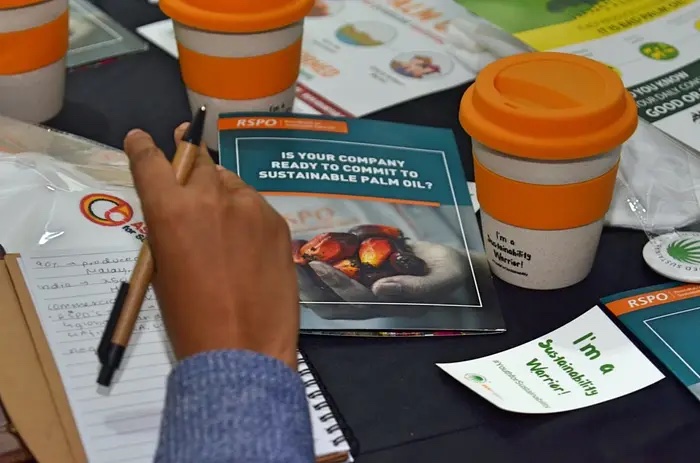This article has been published in partnership with RSPO.
Problems relating to people and the planet are often complex. For example, tropical deforestation and the resulting habitat loss are critical conversations now and for our future. To tackle these issues head-on, we must look at tangible solutions like deforestation-free commodities – sustainability is an opportunity to reset the balance. And one commodity that can help us make positive changes is sustainable palm oil.
From shampoo and toothpaste to chocolate and pizza, almost 50% of products you buy at the supermarket have palm oil as an ingredient. The affordability and versatility of palm oil have made it one of the most widely used vegetable oils across the world.
However, one of the most urgent issues facing palm oil-producing countries is deforestation and protecting peatlands, as well as the associated destruction of biodiversity.
So let’s look at how we can find a sustainable balance and why switching to sustainable palm oil is the way forward.
Agriculturally profitable
The cultivation of oil palm is a profitable industry and a critical livelihood contribution and source of employment in Malaysia and Indonesia. The production of palm oil is responsible for economic growth and poverty reduction for millions across the world, especially Asia.
This widely grown crop bears fruits within just three years of planting and can continue to yield a good harvest for 20 to 30 years. Each oil palm produces a harvest twice a month, allowing farmers to have a year-round source of income.

Furthermore, the production of oil palm can be particularly profitable for the farmers because not just the fruits but the entire crop can be sustainably used. For instance, the leaves, trunk, and fruit bunches, can be used to make furniture, fuel, and other materials. This holistic use of oil palms is a critical part of promoting sustainable palm oil production.
Talking about the impact of oil palm cultivation for small farmers, agricultural economist at the University of Göttingen and an expert in the field, Matin Qaim, said “It is often assumed that oil palm is only grown on large industrial plantations. In reality, however, around half of the world’s palm oil is produced by smallholder farmers. Our data show that oil palm cultivation increases profits and incomes in the small farm sector, in addition to raising wages and creating additional employment for rural labourers. Although there are incidences of conflicts over land, overall, the oil palm boom has significantly reduced rural poverty in Indonesia and other producing countries.”
Why is palm oil so popular?
Palm oil is a particularly versatile oil that has many different properties and functions, making it widely used in many of the everyday items found on supermarket shelves. It has excellent cooking properties that can be maintained under high temperatures, and is used to give fried products a crispy and crunchy texture. As it is semi-solid at room temperature, palm oil can be made into a smooth and creamy, spreadable texture. The absence of smell and colour also makes palm oil a favourable ingredient in many recipes, including baked goods like cookies. Additionally, palm oil can give products a longer shelf-life, as it is resistant to oxidation.
No sustainable alternative
When grown unsustainably, oil palm agriculture can have damaging impacts on the environment, potentially destroying the habitats of unique animal species, such as elephants, orangutans, and tigers, as well as tropical rainforest tree species like kempas, ramin, and meranti.
Although using other vegetable oils (such as sunflower, soybean, or rapeseed) seems like a practical solution, it would actually create similar, if not larger, environmental and social problems. The success of the oil palm is due to the fact that it produces very high yields per unit area. At a global average of 3.3 tonnes of oil per hectare, the oil palm produces a higher per-hectare yield than any other oilseed crop and is thus the most efficient in terms of its land footprint.

The International Union for Conservation of Nature (IUCN) report, Oil Palm and Biodiversity, stated that given other oil crops require up to nine times more land to produce the same amount of oil as the oil palm tree, its replacement would significantly increase the total land area used for vegetable oil production to meet global demand. Avoiding further palm oil-related deforestation will deliver the biggest gains for biodiversity by far, the report found. That’s why it’s important to make sustainable production of palm oil the norm.
What can we do?
As one of the most powerful stakeholders in the soft-commodity supply chain, consumers like you have the power to make a difference, and it starts by choosing products that only contain sustainably sourced and produced palm oil.
In response to the urgent and pressing global call for sustainably produced palm oil, the Roundtable on Sustainable Palm Oil (RSPO) was formed in 2004. This not-for-profit, international membership organisation aims to unite key stakeholders from the seven sectors of the palm oil industry – producers, processors or traders, consumer goods manufacturers, retailers, banks and investors, and environmental and social non-governmental organisations (NGOs) – to develop and implement global standards for sustainable palm oil production. Its goal is to transform markets to make sustainable palm oil the norm. At the heart of this organisation are the RSPO Principles and Criteria (P&C), a set of stringent standards for sustainable palm oil production that RSPO members must comply with.

Achieving a sustainable palm oil supply chain, which respects biodiversity, natural ecosystems, deforestation, local communities, and workers in palm oil producing countries is a global challenge.
To ensure RSPO members contribute effectively to halting deforestation and transitioning to a deforestation-free palm oil sector, the RSPO standard for growers, the 2018 RSPO P&C, include criteria that aims to address deforestation while balancing the need for development, poverty alleviation, and community livelihoods in High Forest Cover Countries (HFCCs). When grown sustainably and in line with the RSPO P&C, a space is created where palm oil agriculture and the environment can co-exist, primary and secondary forests are protected, and the habitats of wildlife are not harmed.
The P&C also ensures that fundamental rights of previous land owners, local communities, plantation workers, and smallholder farmers are respected and fully taken into account. All RSPO members are required to pay all workers a decent living wage, including those on piece rates or quotas, which are calculated based on the Global Living Wage Coalition (GLWC) methodology.
While the efforts of organisations like RSPO, with close to 5,000 members from 99 countries, are driving positive change, as consumers, we can support change by making the right and responsible choice.
So, make an effort to #KnowYourPalm. Take the pledge to demand for RSPO certified sustainable palm oil and tell your family and friends to do the same.
No comments:
Post a Comment